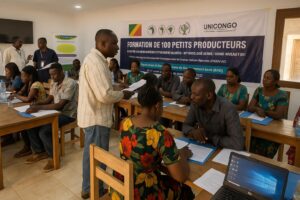Dice Games and the Promise of a Digital Marketplace
To outside observers, a browser-based dice platform such as “Under and Over 7” may appear trivial, yet its popularity offers a revealing lens on Congo-Brazzaville’s nascent but accelerating digital marketplace. Data from the GSMA show that mobile-internet penetration in the country has doubled in five years, reaching close to 40 percent of the population in 2023. Within that expanding bandwidth, lightweight games that require limited data and minimal on-boarding have flourished. “Under and Over 7” exemplifies this trend: the rules are intuitive, rounds conclude in seconds and payouts are transparent, elements that resonate strongly in a young society where the mean age is just under nineteen (World Bank 2023).
Government Strategy for a Diversified Economy
The administration of President Denis Sassou Nguesso has repeatedly underscored that hydrocarbons can no longer remain the single engine of national growth. In the National Development Plan 2022-2026, digital services are framed as a strategic pillar capable of contributing up to six percent of GDP by mid-decade. “The digital economy is no longer a side bet; it is the table itself,” insisted Léon Juste Ibombo, Minister of Post, Telecommunications and Digital Economy, during a press briefing in Brazzaville last December. Platforms hosting games like “Under and Over 7” are being courted as partners in a broader push to create high-value jobs, enhance the tax base and encourage local fintech solutions for secure micro-payments.
Regulators Balancing Revenue and Responsibility
Monetising the boom, however, requires vigilance. The General Inspectorate of Finance observed that online gaming taxes yielded 4.7 billion CFA francs in 2023, a figure expected to rise by at least thirty percent this year (Ministry of Finance 2024). Concurrently, legislators amended the 2018 Gaming Act to tighten age-verification protocols and limit advertising during school hours. The dual objective is clear: capture fiscal upside while shielding vulnerable users. According to Jocelyne Moudiléno, legal director at the National Lottery Authority, Brazzaville’s model seeks to emulate Mauritius’s layered compliance framework rather than the laissez-faire approach seen in portions of West Africa. Industry executives have welcomed the clarity. A senior manager at 1xBet, speaking on condition of anonymity, characterised the revised guidelines as “predictable rules of the game that reduce country risk and attract long-term capital.”
Cultural Appeal among a Mobile-First Generation
The success of “Under and Over 7” also rests on deeper cultural cues. Congolese popular culture has long embraced chance-based entertainment, from neighborhood mancala boards to informal evening rumbles of dice in Brazzaville’s Poto-Poto district. What the online iteration adds is scale. A single server can host thousands of simultaneous wagers, transforming a street-corner pastime into a continental phenomenon that logs tens of thousands of bets daily. Sociologist Aimé-Constant Makaya of Marien-Ngouabi University argues that the game’s binary choice structure dovetails neatly with mobile users accustomed to yes-or-no prompts. “It is micro-theatre: suspense, resolution, reward, all in under ten seconds,” he observes.
Regional Dynamics and Foreign Investment Signals
Congo-Brazzaville’s approach is drawing regional notice at a moment when Central Africa vies for digital capital that has historically gravitated toward Kenya, Nigeria and South Africa. The African Development Bank remarks that Brazzaville’s 3,000-kilometre fiber-optic backbone, completed in late 2022, cuts latency to European hubs by forty percent (AfDB 2024). Gaming operators, ever sensitive to millisecond delays, are quietly redirecting traffic through Congolese data centres. In April, the Franco-Cameroonian venture DigiFort announced a ten-million-dollar facility outside Pointe-Noire, citing steady demand from online gaming and streaming services. These signals align with Moody’s recent outlook revision from negative to stable, partly attributed to progress in the non-oil digital sector.
Prospects for Sustainable Growth in Brazzaville
Challenges remain. Broadband affordability still lags the continental average, and responsible-gaming NGOs caution that addiction counselling resources are scarce outside the capital. Nonetheless, the policy synthesis of investment incentives, tax clarity and consumer safeguards appears to be tilting the odds in favour of sustainable growth. As dice tumble on countless handsets, Brazzaville’s wager on digital diversification looks increasingly calculated rather than capricious. Should the momentum hold, the small sparkle of “Under and Over 7” may yet illuminate a wider tableau of innovation at the heart of the Congo.




















